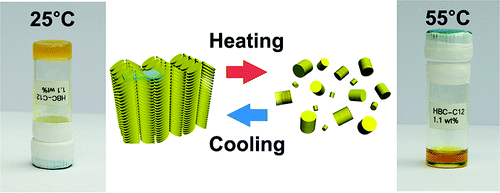Publication
 HOME > Publications > Publication
HOME > Publications > Publication Phase Behavior of Hexa-peri-hexabenzocoronene Derivative in Organic Solvent Hit : 406
Hyo-Sik Kim, Ji-Hwan Lee, Tae-Hwan Kim, Satoshi Okabe, Mitsuhiro Shibayama, and Sung-Min Choi
115, 7314 (2011)
 http://dx.doi.org/10.1021/jp200882n
http://dx.doi.org/10.1021/jp200882n
Abstract

The phase behavior of HBC-C12 in p-xylene at various concentrations has been investigated by differential scanning calorimetry, polarized optical microscopy, small angle neutron scattering and wide-angle X-ray scattering techniques, and a phase diagram depending on concentration and temperature has been determined with detailed structural information. At room temperature, HBC-C12 in p-xylene forms needle-like crystalline aggregates with a rectangular columnar packing which is essentially the same as the crystalline phase of HBC-C12 in bulk. Upon heating, it undergoes two transitions, a transition from the rectangular columnar packing to another rectangular columnar packing with a small step change in the lattice parameter c, and then a transition to isotropic phase. In the isotropic phase, HBC-C12 molecules form stacked cylindrical particles which consist of ∼11–13 molecules depending on temperature. Upon cooling, HBC-C12 in p-xylene makes an abrupt transition from the isotropic to the rectangular columnar packing, which is in contrast with the gradual columnar to isotropic transition upon heating. These results provide important information for optimizing the conditions of discotic liquid crystal solution for the fabrication of DLC thin films using solution-processing techniques.
김효식 2011.gif
115, 7314 (2011)
 http://dx.doi.org/10.1021/jp200882n
http://dx.doi.org/10.1021/jp200882n
Abstract

The phase behavior of HBC-C12 in p-xylene at various concentrations has been investigated by differential scanning calorimetry, polarized optical microscopy, small angle neutron scattering and wide-angle X-ray scattering techniques, and a phase diagram depending on concentration and temperature has been determined with detailed structural information. At room temperature, HBC-C12 in p-xylene forms needle-like crystalline aggregates with a rectangular columnar packing which is essentially the same as the crystalline phase of HBC-C12 in bulk. Upon heating, it undergoes two transitions, a transition from the rectangular columnar packing to another rectangular columnar packing with a small step change in the lattice parameter c, and then a transition to isotropic phase. In the isotropic phase, HBC-C12 molecules form stacked cylindrical particles which consist of ∼11–13 molecules depending on temperature. Upon cooling, HBC-C12 in p-xylene makes an abrupt transition from the isotropic to the rectangular columnar packing, which is in contrast with the gradual columnar to isotropic transition upon heating. These results provide important information for optimizing the conditions of discotic liquid crystal solution for the fabrication of DLC thin films using solution-processing techniques.



